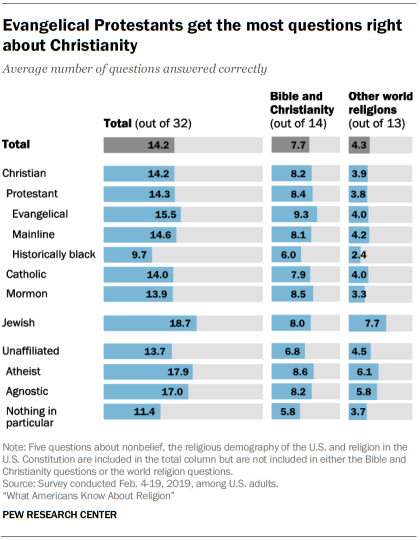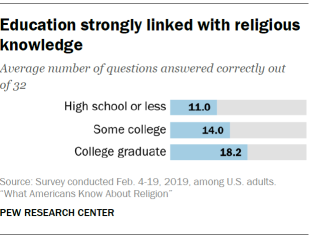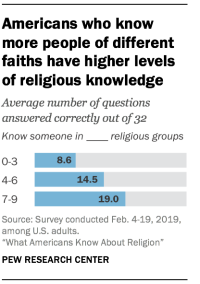Many Americans say that religion is very important in their lives. But how much do people in the U.S. actually know about their faith tradition – or about religions besides their own?
A new report from Pew Research Center tries to answer this question by asking U.S. adults 32 fact-based questions about a variety of religious topics. The survey includes questions about the Bible and Christianity, as well as atheism, agnosticism, Judaism, Islam, Hinduism, Buddhism and Sikhism. Respondents also were asked about religious demographics.
The average U.S. adult is able to answer slightly fewer than half of the religious knowledge questions correctly (14.2 of the 32). But the survey finds that Americans’ level of knowledge varies based on who is answering the questions.
Here are key findings from the report:
Before you read this
Test your religious knowledge by taking an interactive quiz. The short quiz includes some questions recently asked in the nationally representative survey that forms the basis of this report. After completing the quiz, you can see how you did in comparison with the general public and with people like yourself.
Most Americans are familiar with some of the basics of Christianity, and even know a few facts about Islam. But fewer get questions right about Judaism, Hinduism or Buddhism. Eight-in-ten U.S. adults know that in the Christian tradition, Easter commemorates the resurrection of Jesus – rather than the Crucifixion, the Ascension to heaven or the Last Supper. A similar share know the Christian doctrine of the Trinity holds that there is one God in three persons – Father, Son and Holy Spirit. And six-in-ten know that Ramadan is an Islamic holy month and that Mecca is Islam’s holiest city. However, just one-quarter of Americans know that Rosh Hashana is the Jewish New Year. Roughly one-in-five Americans (18%) know that the “truth of suffering” is part of Buddhism’s four “noble truths,” and 15% correctly identify the Vedas as Hindu texts.

Atheists are among the most knowledgeable about religion. Self-described atheists correctly answer 17.9 questions right, on average, and agnostics get 17.0 questions right. Jews and evangelical Protestants also are among the top performers, getting an average of 18.7 and 15.5 questions right, respectively.
Evangelical Protestants get the most questions right about Christianity and the Bible. The survey asked 14 questions about the Bible and Christianity, including questions about biblical figures such as Moses, aspects of Christianity in general and attributes of Protestantism, Catholicism and Mormonism in particular. Evangelical Protestants give the highest number of right answers, answering 9.3 out of 14 on average. Atheists and Mormons also do well, getting an average of 8.6 and 8.5 questions right.

Educational attainment is strongly associated with religious knowledge. College graduates get an average of 18.2 out of 32 religious knowledge questions right, including 18% who answer 25 or more correctly. Within this group, people who have a postgraduate degree do especially well, averaging 19.3 out of 32 questions correct, including one-quarter who answer at least 25 questions right (24%). By comparison, those who have a high school diploma or less education get 11.0 questions right, on average.

Americans who know people belonging to other faiths get more religious knowledge questions right. Respondents to the knowledge survey who say they know someone who belongs to a religious group tend to correctly answer more questions about that religion. For example, those who personally know someone who is Muslim are far more likely than those who do not to identify Ramadan as an Islamic holy month (76% vs 46%). Moreover, respondents who know someone from at least seven different religious groups answer 19.0 questions right, on average, while those who know someone from three or fewer religious groups only get 8.6 right.
Those who are most knowledgeable about religion tend to have favorable views of other religious groups. The survey asked respondents to rate nine religious groups on a “feeling thermometer” ranging from 0 (coldest and most negative) to 100 (warmest and most positive) and finds that those who score higher on the knowledge quiz tend to feel more warmly toward most religious groups. Buddhists, for instance, receive an average thermometer rating of 65 degrees from non-Buddhists who answer 25 or more religious knowledge questions correctly, compared with just 49 degrees from those who answer eight or fewer questions correctly.